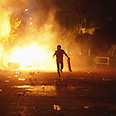

IDF Major General Eyal Eisenberg warned last week that the so-called “Arab Spring” may ultimately turn into a “radical Islamic winter.” Recent events in Egypt and elsewhere in the region indicate that this grim assessment is materializing at a rapid pace right before our eyes.
Foolish Western observers who lauded the “great revolutions” sweeping the Middle East have displayed profound ignorance, failing to comprehend that the region is woefully unprepared for democracy. In this respect, the downfall of brutal tyrants – a pleasing development in and of itself - is worthless if followed by greater evils.
Regrettably, the growing Mideastern chaos has shattered any semblance of regional stability, allowing the darkest, most radical forces to erupt and increasingly set the tone. What we saw in Egypt over the weekend was merely the beginning. Much worse is yet to come.
Arab affairs expert Guy Bechor notes that the siege and near-lynch at Israel’s Cairo embassy is first and foremost a domestic affair, reflecting the great deterioration on Egypt’s streets. The orgy of violence and lawlessness we witnessed marks the rise of Islamists and street thugs and the State’s declining ability to impose law and order.
While Egypt’s misfortune may hold grave regional and global implications, the first to pay the price for this tragedy will be ordinary Egyptians. Hence, it is no wonder that one of the revolution’s symbols, Wael Ghonim, said over the weekend that "what we are witnessing now is contrary to what I dreamt of. We need to wake up quickly.” Unfortunately for him, he and his countrymen are already deeply embroiled in a nightmare.
The Palestine lesson
Egypt is of course not the only state where chaos reigns supreme ahead of an uncertain, frightening future. In Libya, rebels are dusting off what’s left of Muammar Gaddafi’s regime, under the leadership of none other than “former Jihadist” Abdel Hakim Belhaj. The Islamic militant has downplayed his past, insisting that he seeks no revenge despite the torture he experienced in prison courtesy of the West. How sincere are his words? Only time will tell.
What is certain, however, is that the post-revolution Tripoli has already become a menace to regional stability. Last week, Israeli officials warned that Palestinians in Gaza have acquired anti-aircraft and anti-tank rockets from Libya. Meanwhile, the European Union’s counter-terrorism’s chief warned that al-Qaeda may have also secured arms looted in the Libyan conflict, including surface-to-air missiles that could threaten commercial airliners.
Europe’s Terror Chief Gilles de Kerchove went even further, stressing that “democracy does not happen overnight” and cautioning that the string of Arab world uprisings has “provided a huge opportunity for al-Qaeda to re-energize.” Such warnings would have been much more meaningful six months ago, but at the time much of the West was celebrating the “imminent rise of Mideastern democracies.”
The failure to predict the Arab Spring’s grim outcome is a huge fiasco, especially as the ensuing calamity should have been patently clear to anyone with minimal understanding of our volatile region. Yet as is often the case, many in Europe and America chose to put their trust in empty words and cheerful notions completely detached from reality, while dismissing common sense and the Arab world’s history and tradition. They too will be paying the price sooner or later.
The lesson learned from the Arab Spring is particularly relevant this month as the Palestinians prepare to submit their UN statehood bid. This too is an obvious case of pretty rhetoric masking bleak realities on the ground. The Palestinian entity in the West Bank does not meet the minimal criteria for viable statehood, with global recognition likely paving the way for a failed, terrorist state on Israel’s doorstep. Will the world be wise enough to avert such catastrophe? Sadly, the Arab Spring debacle leaves little room for optimism.
- Follow Ynetnews on Facebook
- Receive Ynetnews updates
directly to your desktop















